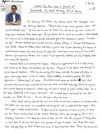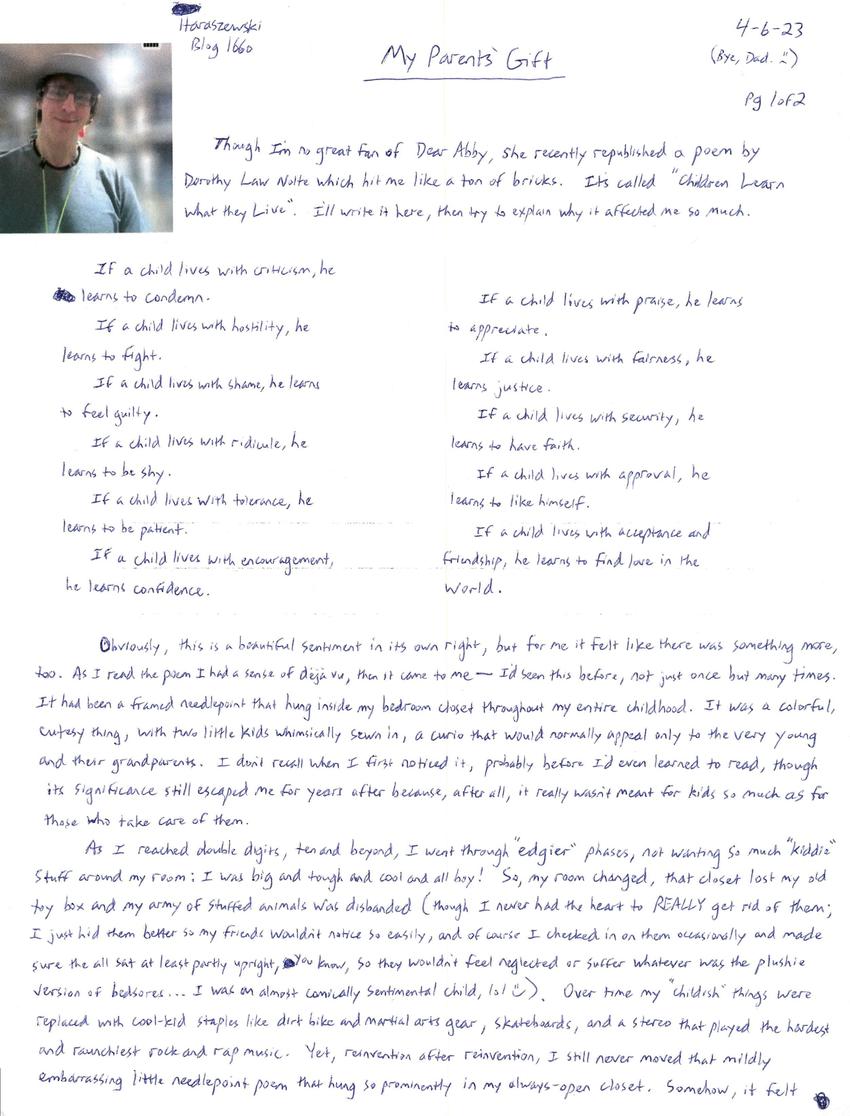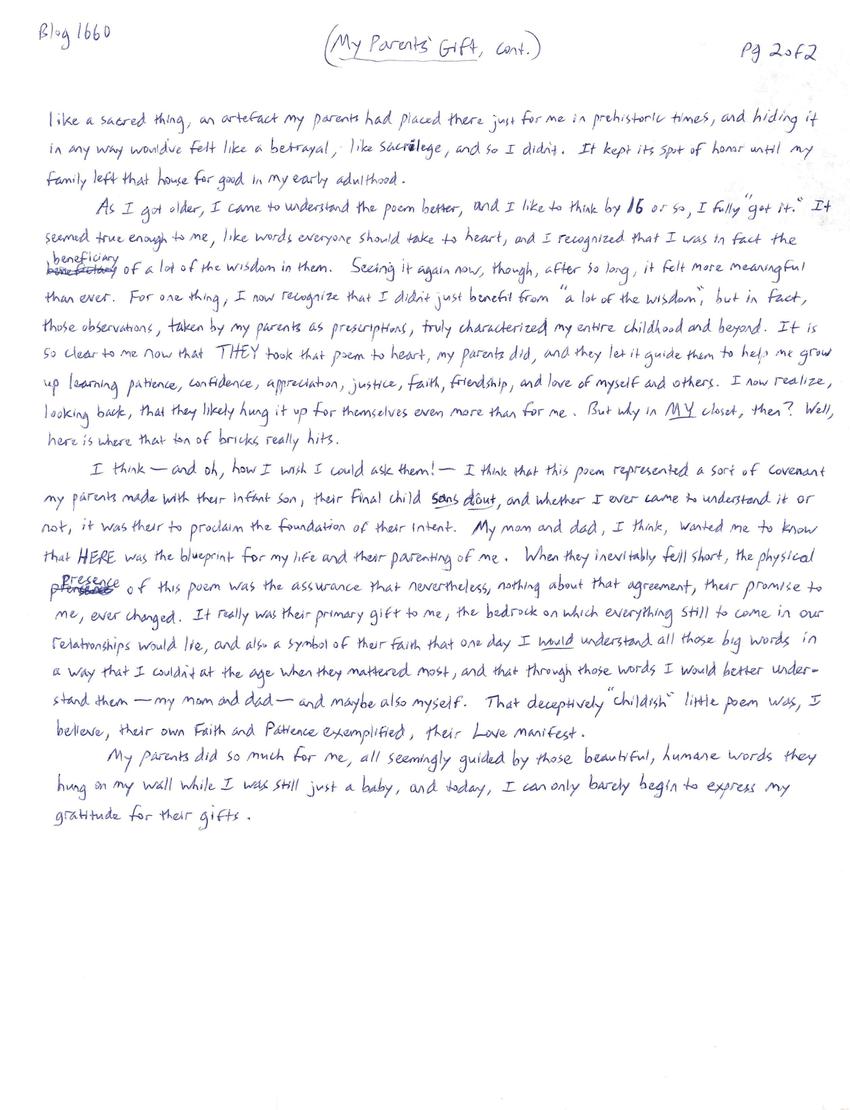
Transcription
[Colored photo of the author. He's wearing glasses, a baseball cap, and what looks like a neon green lanyard. He's looking at the camera with a smile.]
4-6-23
Bye, Dad :(
My Parents' Gift
Though I'm no great fan of Dear Abby, she recently republished a poem by Dorothy Law Nolte which hit me like a ton of bricks. It's called Children Learn What They Live. I'll write it here, then try to explain why it affected me so much:
CHILDREN LEARN WHAT THEY LIVE
--Dorothy Law Nolte
If a child lives with criticism, he learns to condemn.
If a child lives with hostility, he learns to fight.
If a child lives with ridicule, he learns to be shy.
If a child lives with shame, he learns to feel guilty.
If a child lives with tolerance, he learns to be patient.
If a child lives with encouragement, he learns
confidence.
If a child lives with praise, he learns to appreciate.
If a child lives with fairness, he learns justice.
If a child lives with security, he learns to have faith.
If a child lives with approval, he learns to like himself.
If a child lives with acceptance and friendship, he
learns to find love in the world.
Obviously this is a beautiful sentiment in its own right, but for me it felt like there was something more, too. As I read the poem, I had a sense of déjà vu, then it came to me—I'd seen this before, not just once but many times. It had been a framed needlepoint that hung inside my bedroom closet throughout my entire childhood. It was a colorful, cutesy thing, with two little kids whimsically sewn in. A curio that would normally appeal only to the very young and their grandparents.
I didn't recall when I first noticed it. Probably before I'd even learned to read, though its significance still escaped me for years after because, after all, it really wasn't meant for kids so much as for those who take care of them.
As I reached double digits, ten and beyond, I went through "edgier" phases, not wanting so much "kiddie" stuff around my room. I was big and tough and cool and all boy! So my room changed. That closet lost that old toy box and my army of stuffed animals was disbanded (though I never had the heart to REALLY get rid of them; I just hid them better so my friends wouldn't notice so easily, and of course I checked in on them occasionally to make sure that all sat at least partly upright, you know, so they wouldn't feel neglected or suffer whatever was the plushie version of bedsores... I was an almost comically sentimental child, LOL :)). Over time my childish things were replaced with cool kid staples like dirt bike and martial arts gear, skateboards, and a stereo that played the hardest and ranchiest rock and rap music.
Yet, reinvention after reinvention, I still never moved that mildly embarrassing little needlepoint poem that hung so prominently in my always-open closet. Somehow it felt like a sacred thing, an artifact my parents placed there just for me in prehistoric times. Hiding it in any way would've felt like a betrayal, like sacrilege, so I didn't. It kept its spot of honor until my family left that house for good in my early adulthood.
As I got older, I came to understand the poem better, and I lie to think by 16 or so, I fully "got it." It seemed true enough to me, like words everyone should take to heart, and I recognized that I was in fact the beneficiary of a lot of wisdom in them. Seeing it again now, though, after so long, it felt more meaningful than ever.
For one thing, I know recognize that I didn't just benefit from "a lot of wisdom," but in fact, those observations taken by my parents as prescriptions truly characterized my entire childhood and beyond. It is so clear to me now that THEY took that poem to heart. My parents did. They let it guide them to help me grow up: learning patience, confidence, appreciation, justice, faith, friendship, and love of myself and others. I now realize, looking back, that they likely hung it up for themselves even more than for me.
But why in MY closet, then? Well, here is where that ton of bricks really hits.
I think—and oh, how I wish I could ask them!—that this poem represented a sort of covenant my parents made with their infant son, their final child sans dôut, and whether I ever came to understand it or not, it was there to proclaim the foundation of their intent. My mom and dad, I think, wanted me to know that HERE was the blueprint for my life and their parenting of me.
When they inevitably fell short, the physical presence of this poem was the assurance that nevertheless, nothing about that agreement, their promise to me never changed. It was really their primary gift to me, the bedrock on which everything still to come in our relationship would lie, a symbol of their faith that one day I would understand all those big words in a way that I couldn't at the age when they mattered most, and that through those words I would better understand them—my mom and dad—and maybe also myself.
That deceptively childish little poem was, I believe, their own faith and patience exemplified, their love manifest.
My parents did so much for me, all seemingly guided by those beautiful humane words they hung on my wall while I was still just a baby. Today, I can only barely begin to express my gratitude for their gifts.
Other posts by this author
|
2026 feb 23

|
2026 jan 14

|
2026 jan 14

|
2026 jan 14

|
2026 jan 14

|
2026 jan 14

|
More... |



Replies